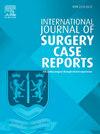A diagnostic challenge: A rare case of PTEN hamartoma of soft tissue of the mental region
IF 0.6
Q4 SURGERY
引用次数: 0
Abstract
Introduction and importance
Phosphatase and tensin homolog (PTEN) hamartomas comprise a spectrum of disorders that involve multiple systems and originate from a group of allelic disorders from germ line mutations in the PTEN gene. PTEN hamartomas involve a spectrum of disorders with diversed clinical manifestations and diagnosis can be challenging, particularly when lesions mimic other conditions.
Case presentation
We present a case of a PTEN hamartoma in an eighteen-year-old male, who presented with a history of swelling on the chin with episodic bleeds. Initial diagnosis of an arteriovenous malformation was made radiologically but was later confirmed by histopathological and immunohistochemistry to be a case of PTEN hamartoma.
Discussion
PTEN is a tumor suppressor gene, and patients with germline PTEN mutations are more likely to develop malignancies, particularly epithelial, mesenchymal, and hematopoietic cancers. PTEN hamartomas cause a variety of conditions, including Cowden syndrome, Bannayan-Riley-Ruvalcaba syndrome, PTEN-related Proteus syndrome, and Proteus-like syndrome. As a result, cancer surveillance is critical in managing PTEN hamartoma tumor syndrome (PTHS) patients. All PTEN mutation carriers should adhere to approved cancer surveillance measures.
Conclusion
This case highlights the unusual presentation of PTHS. It can present as an isolated PTEN hamartoma of Soft Tissue (PHOST) lesion without systemic findings and establishing a genetic diagnosis is important to the patient's future health. A multidisciplinary approach with the clinical, radiologic and pathologic findings of PTHS and PHOST lesions will more rapidly lead to an accurate diagnosis. Prompt diagnosis and appropriate treatment are important to prevent potentially severe outcomes.
求助全文
约1分钟内获得全文
求助全文
来源期刊
CiteScore
1.10
自引率
0.00%
发文量
1116
审稿时长
46 days

 求助内容:
求助内容: 应助结果提醒方式:
应助结果提醒方式:


